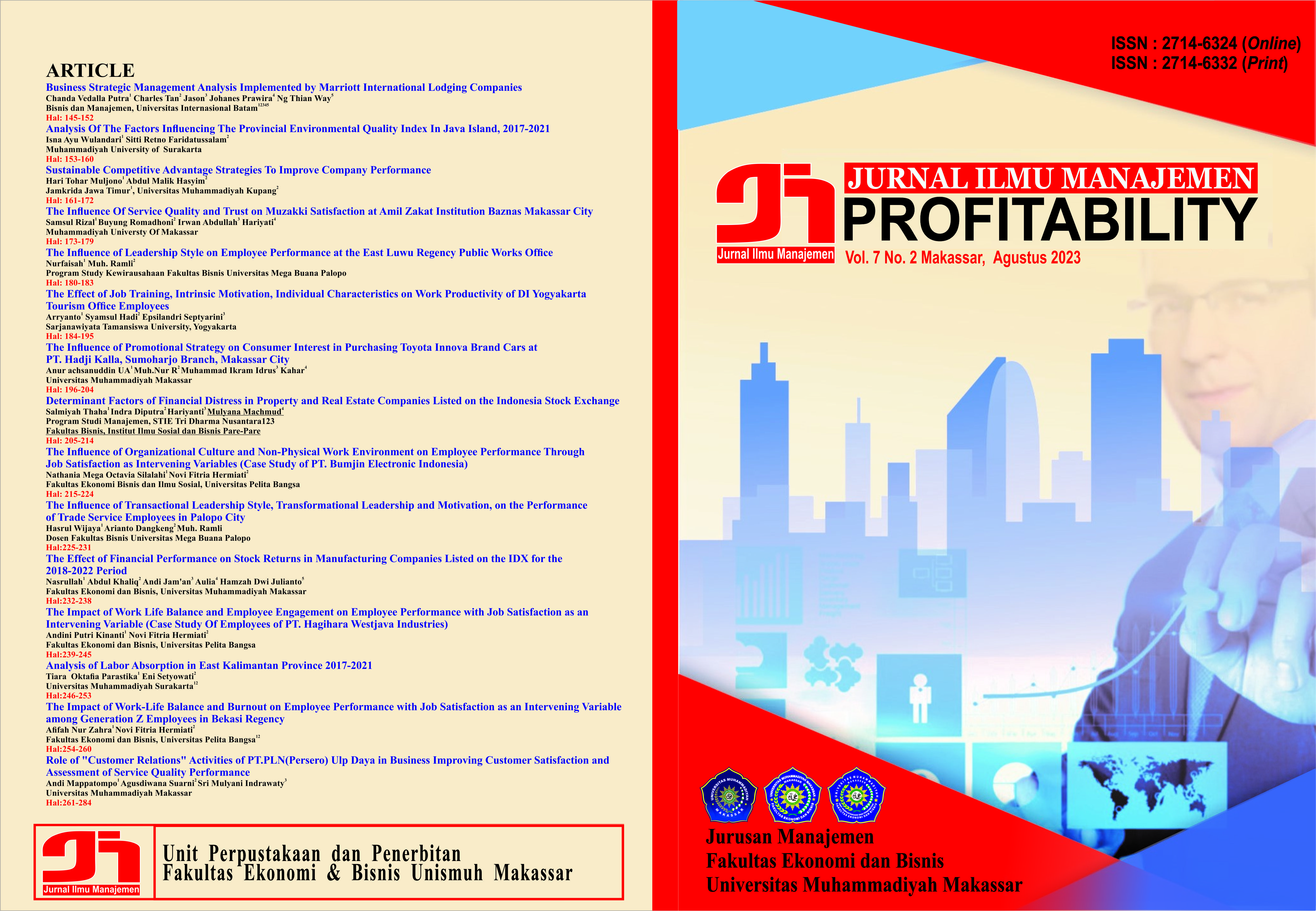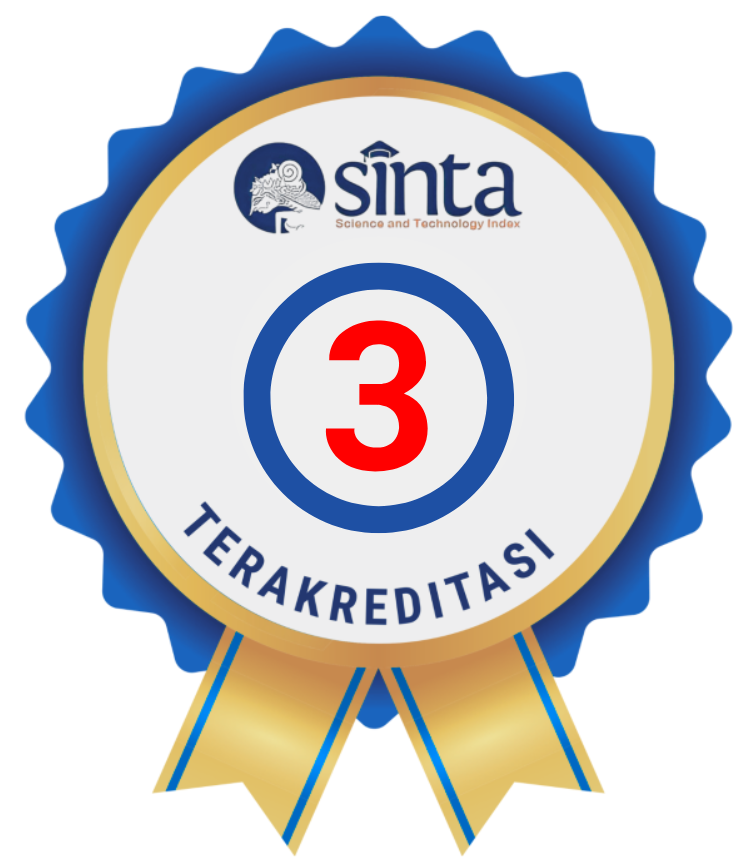The Impact of Transactional Leadership Style, Transformational Leadership, and Motivation on the Performance of Trade Service Employees in Palopo City
DOI: https://doi.org/10.26618/profitability.v7i2.11948
Transactional Leadership, Transformational Leadership and Motivation, Employee Performance.
Abstract
Leadership is about how to influence other people, subordinates or followers to want to achieve the goals desired by the leader. In management science in general, there are 3 (three) models of leadership. In general, we often see these three leadership models in leaders themselves in daily practice in managing offices or companies. Each model has its own color, some arise because of God's grace, some arise very closely related to the nature or character of the person himself, some even arise as a result of the learning process. The results of this study are waiting for a saturated sample where a total population of 50 people is used as a research sample, the survey was conducted from August to September. The results of this study show that: transformational leadership style has a positive but not significant effect on employee performance, transactional leadership style has a negative but not significant effect on employee performance, motivation has a positive but not significant effect on employee performance, motivation is the dominant factor influencing leadership style, the contribution of transformational leadership, transactional leadership, and motivation on employee performance is 20%. This means that a good leadership style is one of the determining factors for employee performance.References
Adair, John, 2008. Kepemimpinan yang memotivasi. Jakarta: PT. Gramedia Pustaka Utama.
Antonio, Syafii, Muhammad, 2007. Muhammad SAW : The Super Leader Super Manager. Jakarta : Tazkia Multimedia & ProLM Centre.Bandung: Penerbit Alfabeta. As’ad, Moh, 1986. Kepemimpinan efektif dalam perusahaan. Yogyakarta: Liberty Yogyakarta. Chen Chen-Jui, Silverthorne Colin, 2005. Leadership effectiveness, leadership style and employee readiness. California: Leadership & Organization Development Journal Vol. 26 No. 4, 2005 pp. 280-288.
Danim, Sudarwan, 2006. Visi Baru Manajemen Sekolah. Jakarta: Penerbit Bumi Aksara. Don Leech, Charles Ray Fulton, 2008. Education: Faculty perceptions of shared decision making and the principal’s leadership behaviors in scondary schools in a large urban district. Vol. 128, Iss. 4; pg. 630, 15 pgs Göran Svensson, Greg Wood. 2005. Management Decision: The serendipity of leadership effectiveness in management and business practices. London: Vol. 43, Iss. 7/8; pg. 1001, 9 pgs Husdarta, 2009, Manajemen Pendidikan Jasmani. Bandung: Penerbit Alfabeta.
Jacobs, D Karen. 2005. An Assessment of Secondary Principals’ Leadership Behaviors and Skills in Retaining and Renewing Science Educators in Urban Schools. University of Oxford, Oxford, England.
Jalal, Fasli dan Supriadi, Dedi. 2001. Reformasi Pendidikan dalam Konteks Otonomi Daerah. Yogyakarta: Adi Cita Karya Nusa. Kartono, Kartini, 2008 : Pemimpin dan Kepemimpinan. Jakarta : PT. Raja Grafindo Persada. Kelley, C Robert. 2005. Relationships Between Measures of Leadership and School Climate. Chula Vista: Vol 126, Iss; pg 17,9 pgs.
Kristiansen, Stein . Praktikno. 2006. Decentralising Education in Indonesia. www. Elsevier.com/locate/ijedudev.
Lukman, Yulia. 2006. Moral Insani Pembentukan Budaya Kerja Perbankan. dalam Budaya Kerja Perbankan. Jakarta: Pustaka LP3ES Indonesia Moleong, Lexy J. 2005. Metodologi Penelitian Kualitatif. Bandung: PT Remaja Rosdakarya.
Mulyadi, 2007. Materi Bintek bagi Kepala Sekolah dan Pengawas. Semarang: Widyaiswara LPMP Jateng.
Mulyasa, 2004. Manajemen Berbasis Sekolah. Bandung : PT. Remaja Rosdakarya Munir, Abdullah, 2008. Menjadi kepala sekolah efektif. Yogyakarta: Penerbit ArRuzz Media. Nasution. 1996. Metode Penelitian Naturalistik Kualitatif. Bandung: Penerbit Tarsito Neuschel P. Robert, 2008. The Servant Leader: Pemimpin Yang Melayani. Jakarta: Akademia.
Pegg, Mike, 1994. Kepemimpinan Positif. Penerjemah: Arif Suyoko. Jakarta: Pustaka Binaman Pressindo Raihani, An Indonesian model of successful school leadership.Riau: Universitas Islam Negeri (UIN) of Riau, Indonesia.
Robbins, SP. 1996. Perilaku Organisasi : Konsep Kontroversi, Aplikasi. Jakarta: PT. Prenhallindo. Sallis, Edward, 2006. Total quality management in education. Yogyakarta: Penerbit. IRCiSoD.
Samino, 2010, Kepemimpinan Pendidkan. Surakarta: Fairuz Media. Siagian P Sondang, 2005. Fungsi-Fungsi Majajerial. Jakarta: Penerbit Bumi Aksara.
Sugiyono, 2007. Metode Penelitian Pendidikan: Pendekatan Kuantitatif, Kualitatif dan R&D. Bandung: Penerbit Alfabeta.
Sutopo, 2002. Metode Penelitian Kualitatif: Dasar teori dan terapannya dalam penelitian. Surakarta: Sebelas Maret University Press.
Udai Pareek, 1996. Perilaku Organisasi. Jakarta: Pustaka Binaman Pressindo.
Wahjosumidjo. 2007. Kepemimpinan Kepala Sekolah. Jakarta: Raja Grafindo Persada.
Wahyudi, 2009, Kepemimpinan Kepala Sekolah Dalam Organisasi Pembelajar. Yu, Victor. 2009. Principal Leadership for Private Schools Improvement: The Singapore Perspective. American University Girne, Cyprus.
Yukl A. Gary, 1998, Kepemimpinan Dalam Organisasi. Jakarta: Prenhallindo Zamroni, 2007, Meningkatkan Mutu Sekolah : Teori, Strategi dan Prosedur. Jakarta: PASP Muhammadiyah.
Downloads
Published
Issue
Section
License
Authors who publish with Jurnal Ilmu Manajemen Profitability agree to the following terms:
Copyright of the articles remains with the authors.
Authors grant the journal the right of first publication with the work simultaneously licensed under a Creative Commons Attribution-NonCommercial 4.0 International License (CC BY-NC 4.0). This license allows others to:
Share (copy and redistribute the material in any medium or format)
Adapt (remix, transform, and build upon the material)
as long as they give appropriate credit to the original author(s) and source, provide a link to the license, and indicate if changes were made. Non-commercial use only.
Authors are permitted to:
Distribute their published work (e.g., post it to an institutional repository or publish it in a book), with an acknowledgment of its initial publication in this journal.
Enter into separate, additional contractual arrangements for the non-exclusive distribution of the journal’s published version of the work (e.g., post it to a class website or institutional archive).
For permissions to use the content published in this journal beyond the scope of the license (e.g., commercial purposes), please contact the editorial office via the journal email.
License Details:
This journal is licensed under a Creative Commons Attribution-NonCommercial 4.0 International License (CC BY-NC 4.0).












